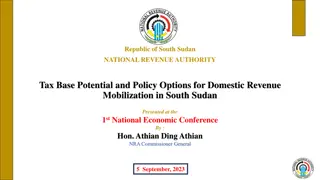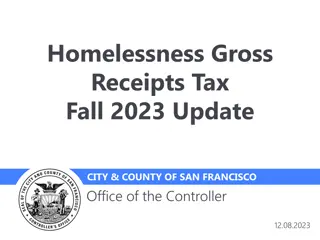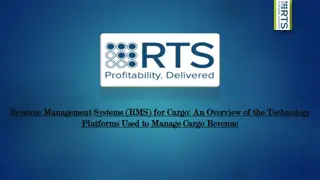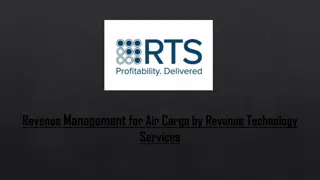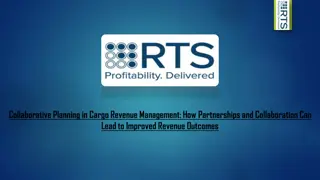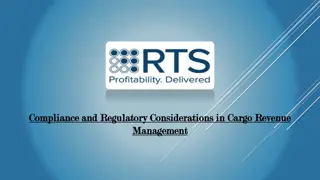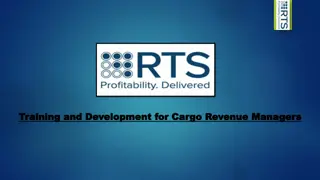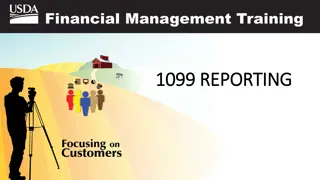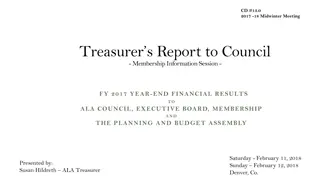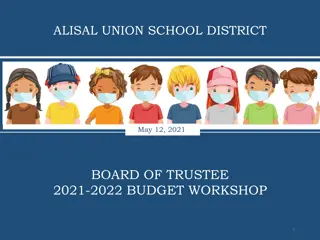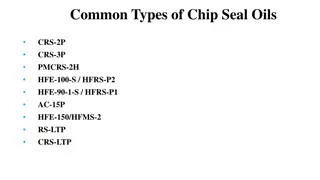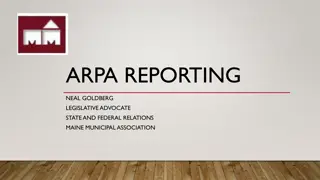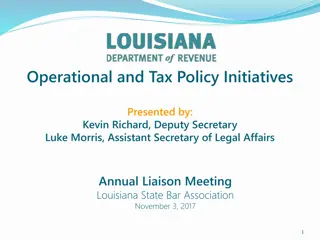Best Practices for CRS/FATCA Compliance in Revenue Reporting
Enhance revenue compliance strategies by promoting good system design, understanding CRS/FATCA rules, and preventing errors. Implement interventions, checks, and validations to ensure accurate reporting. Stakeholder collaboration, governance, training, and documentation are key for effective compliance. Establish robust reporting systems, data extraction, and due diligence procedures for accurate reporting. Respond to compliance risks with a risk-based approach and enhanced procedures.
Download Presentation

Please find below an Image/Link to download the presentation.
The content on the website is provided AS IS for your information and personal use only. It may not be sold, licensed, or shared on other websites without obtaining consent from the author. Download presentation by click this link. If you encounter any issues during the download, it is possible that the publisher has removed the file from their server.
E N D
Presentation Transcript
Virtual Training Session: CRS/FATCA Reporting Revenue Jersey 8 June 2021
Revenue Compliance Strategy Promote Good design of system Understanding of CRS/FATCA rules Prevent Make harder to get it wrong Sense checks and prompts Respond Intervene to correct mistakes Help to get it right going forward
Revenue Compliance Strategy Promote Publishing a list of common errors with FATCA and CRS reports before the next reporting deadline. Identifying entities that have incorrectly classified themselves for FATCA and CRS reporting. Prevent Review of the rationale for entities not submitting FATCA and CRS returns. Enhancement of FATCA and CRS validations for Jersey's AEOI Portal in order to improve the quality of information provided.
Revenue Compliance Strategy Respond: Compliance interventions with financial institutions which present the highest risk of not complying with the FATCA and CRS rules, or the highest reputational risk to Jersey. Code of Practice on Revenue Jersey compliance interventions Risk based approach Compliance checks Sample of accounts Policies and procedures Enhanced compliance checks Governance Systems Internal controls Broader sample of accounts
What good CRS/FATCA compliance looks like Stakeholder collaboration and oversight Governance board and operational levels Responsibilities and controls at the local level Training Mandatory for stakeholders and employees with CRS/FATCA responsibilities and repeated periodically Documentation and record keeping Formal documented policies and procedures tax governance, CRS/FATCA Internal review process Reasonableness checks and exception testing Enhanced procedures for high value pre-existing account holders / undocumented accounts
What good CRS/FATCA compliance looks like Reporting systems, data extraction and report return preparation Consistent extraction and quality of data with multiple systems Effective integration of systems generating reports Adequate procedures implemented to ensure accuracy and completeness Due diligence Self certifications obtained and validated, including TINs for new accounts Controlling persons, joint accounts Process of identifying and dealing with false self certifications Ongoing identification of TINs for US residents and citizens Enhanced due diligence procedure for residence in high risk jurisdictions
Common Errors for CRS/FATCA reporting Undocumented accounts Incorrectly reporting accounts as undocumented Absence of an annual review Due diligence Self-certifications not obtaining/validating for existing and new accounts Critical review of accounts without TINs Lack of scrutiny of documentation Controlling persons not identified Documentation / record keeping Incorrect account holder documentation for relevant account Evidence for classification / reporting
Common Errors for CRS/FATCA reporting Internal controls Matching accounts to incorrect holder Conflicting information between different systems Inadequate integration of data hold on multiple systems Default positions applied by reporting software Reporting account holders of client entities as account holders of the entity submitting the report Incorrectly identifying accounts closed/reopened Incorrect currency code reported
Other considerations Early engagement with stakeholders prior to reporting Central oversight of the totality of reporting Testing of reports submitted by stakeholders that understand the business Sense checking/quality assuring reports in the context of the business prior to submission Number of account holders Values Jurisdictions Designing processes as good governance to improve quality of reports submitted
CRS/FATCA Reporting Obligations CRS/FATCA reporting deadline for the year ended 31 December 2020: Midnight BST, 30 June 2021



